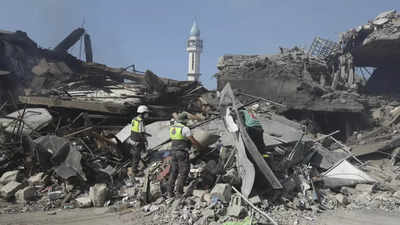
Representative Image (AP photo)
In the war-torn streets of northern
Gaza
, a grim scene unfolds. Bodies lie scattered across dusty roads, entire streets reduced to rubble by
Israeli strikes
and people are struggling to eat food for one time, and in such a starvation situation, a body was found with signs of scavenging by animals.
Fares Afana, the head of emergency services in northern Gaza, paints a harrowing picture of the situation.
He and his colleagues have received the bodies of Palestinians killed in northern Gaza, and told CNN, "Stray dogs who are hungry are eating these bodies in the street… It makes it difficult for us to identify the bodies."
According to Afana, "thousands of children" and pregnant women are trapped in the besieged area, where the Israeli military has conducted aerial and ground attacks in three neighborhoods over the past 12 days, targeting what the Israel Defense Forces (IDF) says is
Hamas
' renewed presence there.
Earlier today, Syrian state media said an Israeli air strike sparked fires in the coastal city of Latakia. "Anti-aircraft defence intercepted hostile targets above Latakia," SANA said.
The news agency reported "fires were triggered by the Israeli aggression" at the entrance to Latakia, a stronghold of President Bashar al-Assad. He is allied with Lebanese militant group Hezbollah, which is at war with Israel.
Meanwhile, the UN's Office for the Coordination of Humanitarian Affairs reported on Sunday that at least 50,000 people have been displaced from the Jabalya area, while the remaining 400,000 in northern Gaza face hunger and relentless bombardment.
"Civilians are given no choice but to either starve or leave,"
Philippe Lazzarini
, the head of the UN's agency for Palestine refugees (
UNRWA
), said in a statement on Monday. "In Gaza, too many red lines have been crossed. What might constitute war crimes can still be prevented."
Despite the Israeli agency managing aid flow into Gaza insisting that Israel "is not preventing the entry of humanitarian aid," Afana reported that on Monday, Israeli forces fired on hungry residents searching for food at a UNRWA-run warehouse aid center. "The situation is getting worse," he said as quoted by CNN.
UNRWA stated that an artillery attack at its Jabalya food distribution center on Monday reportedly killed at least 10 people and injured another 40. CNN has asked the IDF for comment.
According to Gaza's Government Media Office, at least 342 Palestinians have been killed in parts of northern Gaza since the Israeli operations began earlier this month, with hundreds of "civilians, children and women" injured. On Tuesday, Gaza's Civil Defense reported that at least 17 people were killed in northern Gaza.
Abdul Karim Al-Zuwaidi, a 23-year-old Palestinian journalist working for Al Ghad TV, described the once-lively Jabalya refugee camp as a maze of demolished streets. "The scenes, sounds and smells of the invasion are extremely violent," he told CNN in a voice message on Tuesday, with the sound of bombardment rumbling overhead.
Al-Zuwaidi accused the Israeli military of firing on civilians attempting to flee the north at the Abu Sharkh roundabout in Jabalya, as CNN and others have previously reported. CNN reached out to the IDF for comment at the time.
Before the war, Jabalya refugee camp was a vibrant community, with children lining the alleyways and families gathering to celebrate Islamic holidays. "Jabalya camp was very beautiful, full of local markets and bustling with people. It was peaceful and secure," Al-Zuwaidi recalled. "Now, the camp is nothing but ashes."












 English (US) ·
English (US) ·